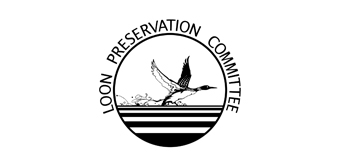Frequently Asked Questions
How do loons ingest lead fishing tackle?
The majority of loons that die from ingested lead tackle acquire it as a result of current fishing activity. They may 1) strike at bait as it is being retrieved through the water; 2) strike at a fish that is being reeled in by an angler; or 3) ingest a fish that has broken a line and has ingested or attached tackle.
In some cases, loons may also pick up small pieces of lead tackle from the lake bottom. Loons normally ingest small pebbles as grit, and they may mistake a split shot or other piece of tackle for a small pebble.
How does lead tackle kill loons?
Once ingested, the lead tackle goes into the loon’s gizzard. The acid and grinding action of the gizzard erodes the lead, which then passes into the bloodstream and organs and poisons the loon. Even a single small lead split shot sinker is fatal to loons, which will die within 2-4 weeks of ingesting a piece of lead fishing tackle.
While some might assume that ingestion of fish hooks might cause loons to die, in fact only a small number of loons die from injuries resulting from swallowing hooks. Loons have evolved to swallow spiny fish so they are able to deal with fish hooks. In the vast majority of loons, the hooks (either hooks on jigs or separate hooks) are very rapidly broken down in the gizzard.
Once a loon has ingested lead tackle, can it be saved?
Only a few loons have been successfully treated for lead poisoning and released. Usually, loons do not display symptoms until lead is already at toxic levels in their bloodstream. At that point, the only option is to humanely euthanize the loon.
What types and sizes of lead tackle do loons ingest? Do weedguards, etc. make a difference?
Loons ingest both lead fishing sinkers and jigs. A sinker is attached to a fishing line to sink it, while a jig is a hook with a lead weight molded around it. Loons have ingested jigs weighing more than 4 oz and sinkers weighing more than 2.5 oz.
The acid and grinding action of a loon’s gizzard erodes lead sinkers and jigs, so hooks, weed guards, and other components of this tackle may no longer be present when it is removed from dead loons. Loons’ ingestion of lead jigs with and without attachments like weedguards has been documented, and neither these nor a painted coating will protect loons from lead poisoning.
How do loons ingest large jigs if their normal food is small fish?
Although loons often eat 4-8” fish, they may occasionally eat fish as large as 12” or more, and have even been documented eating fish as large as 16-17”. If these large fish have ingested tackle and are trailing a broken line, they are not able to swim as well as unimpaired fish and are easy prey for loons. The loons then ingest the tackle—which may be a large jig—as well as the fish. Loons may also strike at large fish or tackle as they are being reeled in.
Why are loons so susceptible to threats affecting adult survival?
Loons are a long-lived species (20-30 years), do not breed until their sixth or seventh year of life on average, and then only produce an average of one chick per pair every two years. Loons need many opportunities to breed over the course of their long life to produce enough surviving chicks to contribute to the population, so survival of adult loons is the most important factor in assuring the continued viability of our state’s loon population.
Does mortality from lead fishing tackle affect New Hampshire’s loons at a population level?
Yes. Lead tackle mortality has inhibited the recovery of New Hampshire’s loon population and reduced the state’s overall number of loons. Using mortality data from 1989-2012, LPC estimated that mortality from lead fishing tackle resulted in a 43% reduction in the state’s loon population. In other words, instead of the 638 adult loons LPC counted in the state in 2012, New Hampshire would have had an estimated 911 adult loons without mortality from lead tackle. LPC recently published this study in the peer-reviewed Journal of Wildlife Management. Click here to read the paper.

Loon Preservation Committee
PO Box 604
Lee’s Mills Rd
Moultonborough, NH 03254
Phone: 603-476-5666
email
© COPYRIGHT · LOON PRESERVATION COMMITTEE · ALL RIGHTS RESERVED · PRIVACY POLICY · TERMS OF USE
